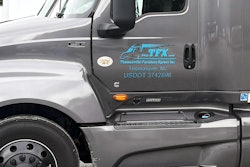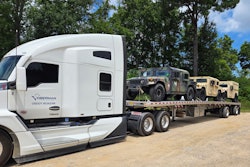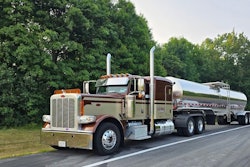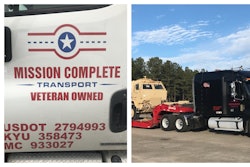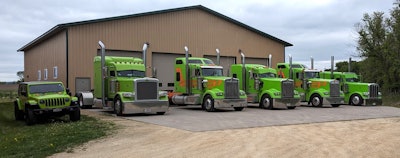
Diversification has been the name of the game for La Crosse, Wisconsin-headquartered Hallahan Transport during the challenging trucking market conditions seen in the last several years.
When Hallahan Transport was last a finalist in Overdrive’s Small Fleet Champ competition in 2021, the fleet was predominantly running dry van freight. By the next year, when owner Robert Hallahan’s custom 2021 Peterbilt 389 “Joke’s on You” won a Working Combo award in Overdrive’s Pride & Polish, Hallahan had begun to pivot into the reefer business at the height of fuel prices and the post-COVID rates lull.
“In 2021, it was hard to buy dry van trailers” due to equipment shortages, “and that’s all we did before 2021,” he said. “We ended up having to buy reefers" with intent to use them without temp control, knowing the trailers might open new opportunities, too. Hallahan Transport would own a half-dozen reefers, hauling a mix of dry and refrigerated commodities.
Hallahan would dip the fleet's toes in other waters, too, testing out what segment might keep drivers happy and the business profitable. Livestock, for instance, "didn’t work out,” he said. “We didn’t really like that.”
Step deck freight and milk hauled in tankers, though, have persisted in offering opportunity to the fleet. Hallahan had a friend doing step deck work, so he gave it a shot and now owns five step deck trailers.

On the milk side, he hasn’t bought any (relatively high-dollar) tankers, but rather works with another friend and trucking company owner with milk customers and tankers dedicated to those operations. The milk side of Hallahan's business started out hauling straight from a farm, “and then a buddy of mine had a couple accounts with milk, and he heard that I was hauling milk, so he asked me if I’d help him.”
[Related: Diversification: The secret to growth, stability for Silver Creek Transportation]
As the freight sands shifted around the trucking business, Hallahan Transport fluctuated in size from as many as 12 trucks down to as few as five. In the 2022-’23 time frame, Hallahan said “the markets were so bad, so my trucks were just, when somebody would quit, I wouldn’t replace them. I’d just leave the truck sitting, because it didn’t make any sense to run a truck for no profit.”
He ran the business at five trucks for a time, before moving into step deck. “Then it got busy,” he said. “We’re always busy with our step decks, so I had to start hiring more people again. We got up to nine of our own trucks and three owner-operators.”
One of those company-owned trucks was just sold so Hallahan could order one of the last Kenworth W900 Legacy Edition models that will roll off the assembly line. He said his build date is for late April 2026, and he was told the last of the 1,000 Legacy Edition W900s will have a build date in early May.
He sold another to an operator in his fleet, so as of mid-August, Hallahan’s fleet stood at 10 trucks with eight company trucks and two owner-operators. With the amount of business he has, and how he operates, he feels it's a good size.
“I don’t really want to be any more than 10, to be honest,” he said. “And that’s including myself.”
Hallahan’s openness to venture outside the comfort zone and is among reasons he is once again a semi-finalist for Overdrive’s Small Fleet Champ award.
 The company's award-winning "Joke's on You" 2022 Peterbilt 389
The company's award-winning "Joke's on You" 2022 Peterbilt 389
Origins in local delivery to business bankruptcy, reboot and rewards
Hallahan’s days in trucking date back to 1990, when he was just 18, with local delivery work for Coca-Cola, before briefly going over-the-road. He settled into regional work pulling gasoline tankers around Iowa, Wisconsin and Illinois. From there, liquid petroleum and other tanker work.
 This is one of several Small Fleet Champ semi-finalist profiles airing throughout the month. (Access all of the published stories via this link.) Two finalists in each category (3-10 trucks, 11-30 trucks) will be announced this coming Friday, October 3.
This is one of several Small Fleet Champ semi-finalist profiles airing throughout the month. (Access all of the published stories via this link.) Two finalists in each category (3-10 trucks, 11-30 trucks) will be announced this coming Friday, October 3.
Through 2017, Hallahan drove full-time over-the-road, self-dispatching as a single-truck carrier. By 2018, he had purchased a new truck and added a lease-purchase operator. In 2019, he invested in two more trucks and trailers. Then again in 2020, he doubled in size, and by the end of that year, Hallahan had come off the road to work in the office dispatching, negotiating loads and managing the business full-time.
That’s pretty much where he remains today, though he does hop in the truck to move a load when needed.
Hallahan’s early experience has paid off with Hallahan Transport, and his customers value the relationship.
“We have worked with Hallahan for many years and consider them one of our top-tier carriers,” said Steve Kadolph with Customodal. “Their professionalism and customer service are second to none. We've had multiple customers specifically request Hallahan as their carrier because they are so easy to work with.”
As business difficulty has ratcheted up in recent years, Hallahan's continued to invest in the fleet. In 2024, he bought four new trailers, two new trucks and, so far in 2025, the new W900 he’ll take possession of next year, along with another new trailer. “We’re still spending the money,” he said. “I wouldn’t say we’re putting money away, you know, but in my opinion, when you’re buying equipment, that’s … kind of the same as putting money away because you’re investing more money into the company.”
[Related: From one truck to many: D. Weaver Trucking grows through rough times with end dumps]
Before the post-COVID market downturn, Hallahan was trading equipment on a two-year cycle, particularly his Peterbilt 389 and Kenworth W900 units. With both models being discontinued, he’s likely hold onto those but continue trading his Kenworth T680s on a more regular basis.
The quality of Hallahan’s equipment isn’t lost on customers, that’s sure.
"I use Hallahan almost daily,” said Jon Saxer, logistics manager with Sugar River Logistics. “I have never had them fall off a load, and they are my go-to carrier. They have some of the nicest looking and best maintained equipment that I have seen from any company.”
Keeping drivers well-equipped, incentivized, happy
Top-shelf equipment well-maintained, like that owned by Hallahan Transport, can go a long way in recruiting and retaining operators. Yet it's compensation that's probably the biggest factor determining whether a driver plays the long game with a fleet owner -- or not. At Hallahan Transport, pay packages are simple, with company drivers paid 27% of gross, leased owners bringing 80% of the gross.
Drivers receive paid holidays, too, healthcare reimbursement, bonuses for clean inspections, and quarterly bonuses for those who qualify.
 The National Association of Small Trucking Companies sponsors the Small Fleet Championship. Finalists receive a year's worth of membership in the association, with access to a myriad of benefits from NASTC's well-known fuel program to drug and alcohol testing services and much more. All will be recognized at the association's annual conference, where the winners will be announced October 23 in Nashville, Tennessee. Find more about the association via their website.
The National Association of Small Trucking Companies sponsors the Small Fleet Championship. Finalists receive a year's worth of membership in the association, with access to a myriad of benefits from NASTC's well-known fuel program to drug and alcohol testing services and much more. All will be recognized at the association's annual conference, where the winners will be announced October 23 in Nashville, Tennessee. Find more about the association via their website.
"If they get a brake out of adjustment or a tire they didn’t tell me about that's bad, or they got a flat tire, it’s their responsibility to make sure that’s stuff’s good," Hallahan said.
For more extensive repairs that might arise, he's moved to insultate the business from excess repair outlays, too, changing his approach from the factory to longer warranties. “We used to just get the 100,000-mile warranty it came with,” he said. “And then we’d trade them in at like, 150, 200,000. But now we’re probably going to keep them because we’re doing a 500,000-mile warranty.”
Still, Hallahan performs a good deal of regular and minor maintenance items on the trucks himself in the home shop -- “tires and stuff like that," he said, "just easy stuff we’ll do in our own shop. But obviously any motor work, which is all under warranty,” they take in to the dealer. Oil changes might happen at Speedco or similar shops out on the road at a 40,000-mile interval.
[Related: LTL furniture specialist TFX lays solid ground for growth, stability]

